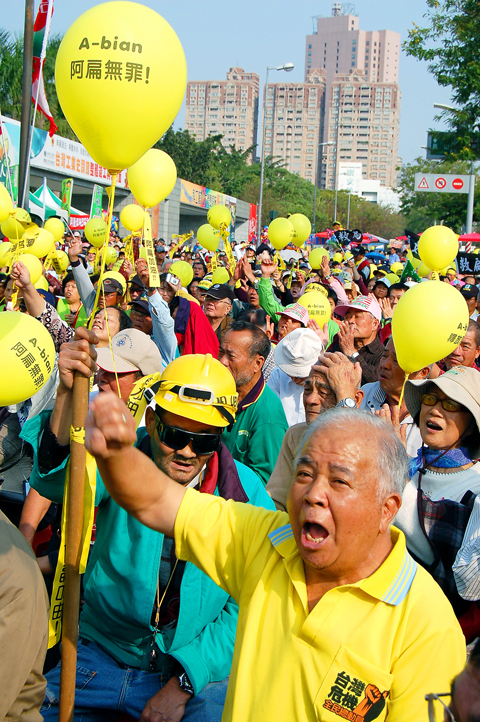The so-called “1992 consensus” between Taiwan and China never existed and is nothing but a lie, former president Chen Shui-bian (陳水扁) said yesterday.
In an excerpt of an interview published by the Chinese-language Formosa Weekly, which was founded by former vice president Annette Lu (呂秀蓮), Chen described the “one China, different interpretations consensus” President Ma Ying-jeou (馬英九) has been insisting on as “the biggest lie in history.”
Chen referred to talks between former president Lee Teng-hui (李登輝), former Mainland Affairs Council chairman Huang Kun-hui (黃昆輝) and late Straits Exchange Foundation chairman Koo Chen-fu (辜振甫) to support his argument, saying it would be impossible for Ma to help Taiwanese reach a consensus regarding cross-strait issues based on the “1992 consensus.”

PHOTO: HOU CHENG-TAN, TAIPEI TIMES
Chen said he did not support the “1992 consensus,” which was based on “Republic of China [ROC]” or “president of the ROC.” The greatest common denominator between pan-blues and pan-green on national identity, Chen said, is “Taiwan,” not the “ROC.”
Chen said Taiwan’s democratization and future referendum proposals should focus on rejecting unification with China and protecting Taiwan.
Chen also accused Ma of lying when he said that it would be easier for Taiwan to sign free-trade agreements (FTA) with other countries after both sides of the Taiwan Strait sign an economic cooperation framework agreement (ECFA).
As Beijing never saw Taiwan as a country, but rather as a region of China, Chen said China could not agree that Taiwan is eligible to sign FTAs with other countries.
The Ma administration’s proposed ECFA originated from plans for a comprehensive economic cooperation agreement (CECA) with China. A CECA is similar to the comprehensive economic partnership agreement (CEPA) that was intended to “build closer economic and trade ties between Hong Kong and China,” Chen said.
Given China’s refusal to abandon the military option against Taiwan and the growing number of missiles it aims at it, any negotiations on a cross-strait peace agreement and establishment of cross-strait military security mechanisms would be made under a “one China” precondition, Chen said.
Chen said Ma was unlikely to benefit from his cross-strait policy in his re-election bid.
Chen has been confined at the Taipei Detention House in Tucheng (土城), Taipei County, since December 2008 on charges of corruption, money laundering and embezzlement.
Both Chen and his wife, Wu Shu-jen (吳淑珍), were sentenced on Sept. 11 by the Taipei District Court to life in prison on several counts of corruption.

Taiwan is to commence mass production of the Tien Kung (天弓, “Sky Bow”) III, IV and V missiles by the second quarter of this year if the legislature approves the government’s NT$1.25 trillion (US$39.78 billion) special defense budget, an official said yesterday. Commenting on condition of anonymity, a defense official with knowledge of the matter said that the advanced systems are expected to provide crucial capabilities against ballistic and cruise missiles for the proposed “T-Dome,” an advanced, multi-layered air defense network. The Tien Kung III is an air defense missile with a maximum interception altitude of 35km. The Tien Kung IV and V

The disruption of 941 flights in and out of Taiwan due to China’s large-scale military exercises was no accident, but rather the result of a “quasi-blockade” used to simulate creating the air and sea routes needed for an amphibious landing, a military expert said. The disruptions occurred on Tuesday and lasted about 10 hours as China conducted live-fire drills in the Taiwan Strait. The Civil Aviation Administration (CAA) said the exercises affected 857 international flights and 84 domestic flights, affecting more than 100,000 travelers. Su Tzu-yun (蘇紫雲), a research fellow at the government-sponsored Institute for National Defense and Security Research, said the air

Taiwan lacks effective and cost-efficient armaments to intercept rockets, making the planned “T-Dome” interception system necessary, two experts said on Tuesday. The concerns were raised after China’s military fired two waves of rockets during live-fire drills around Taiwan on Tuesday, part of two-day exercises code-named “Justice Mission 2025.” The first wave involved 17 rockets launched at 9am from Pingtan in China’s Fujian Province, according to Lieutenant General Hsieh Jih-sheng (謝日升) of the Office of the Deputy Chief of the General Staff for Intelligence at the Ministry of National Defense. Those rockets landed 70 nautical miles (129.6km) northeast of Keelung without flying over Taiwan,

City buses in Taipei and New Taipei City, as well as the Taipei MRT, would on Saturday begin accepting QR code payments from five electronic payment providers, the Taipei Department of Transportation said yesterday. The new option would allow passengers to use the “transportation QR code” feature from EasyWallet, iPass Money, iCash Pay, Jkopay or PXPay Plus. Passengers should open their preferred electronic payment app, select the “transportation code” — not the regular payment code — unlock it, and scan the code at ticket readers or gates, General Planning Division Director-General Liu Kuo-chu (劉國著) said. People should move through the